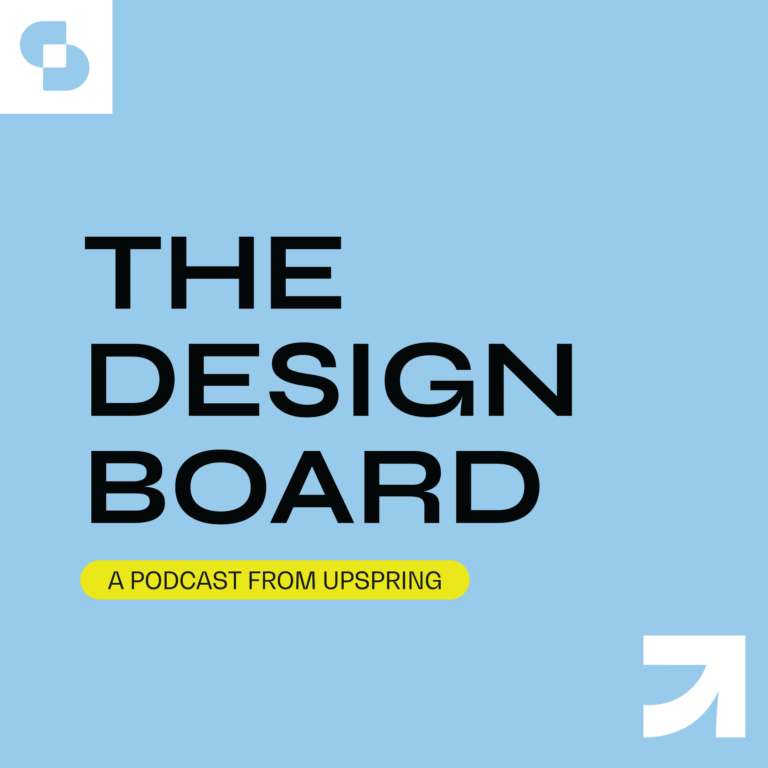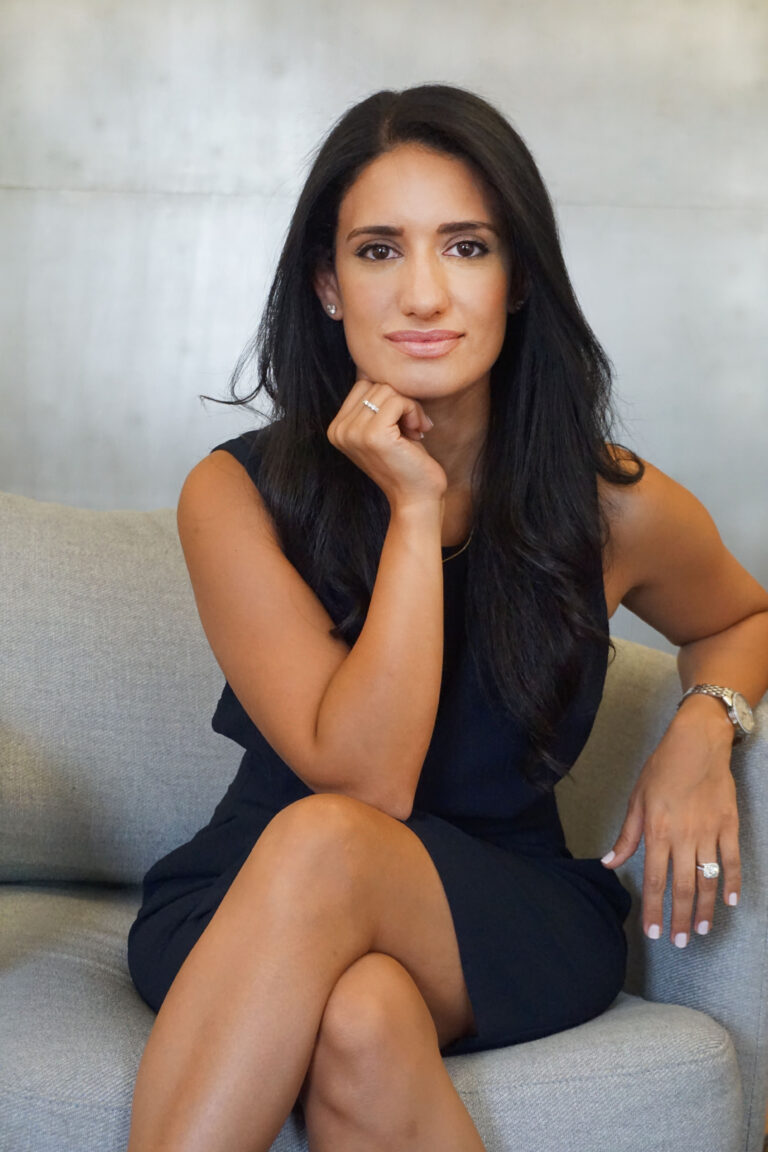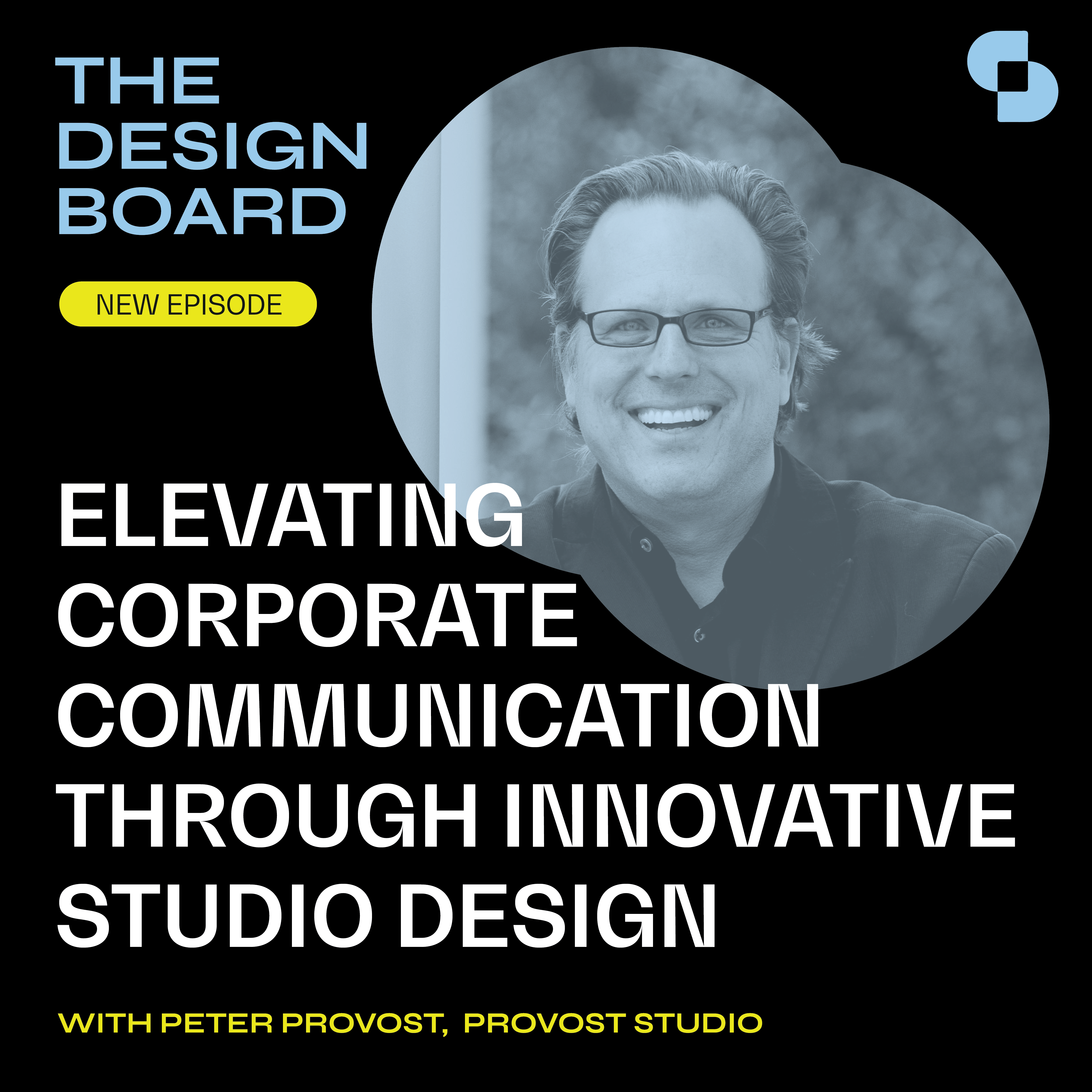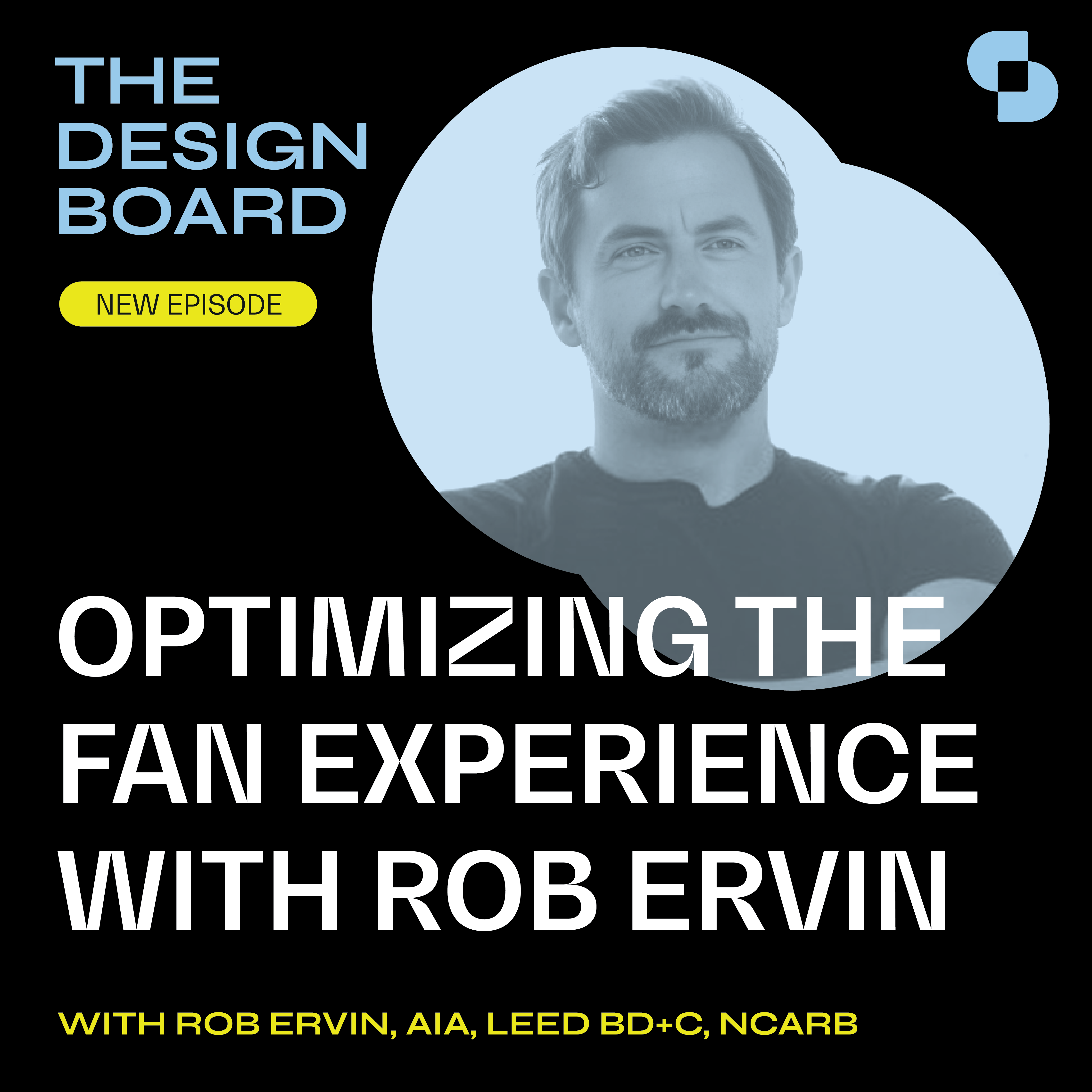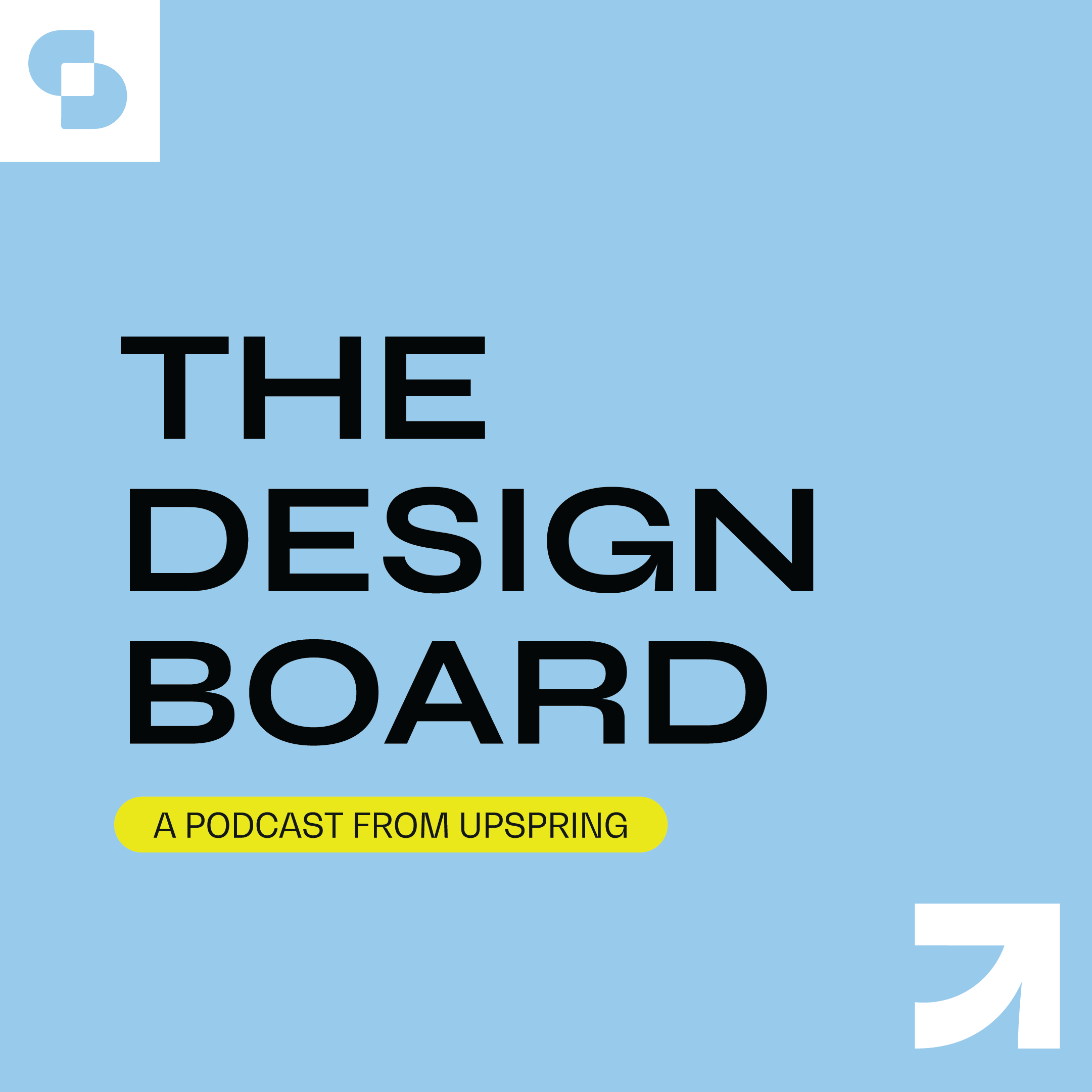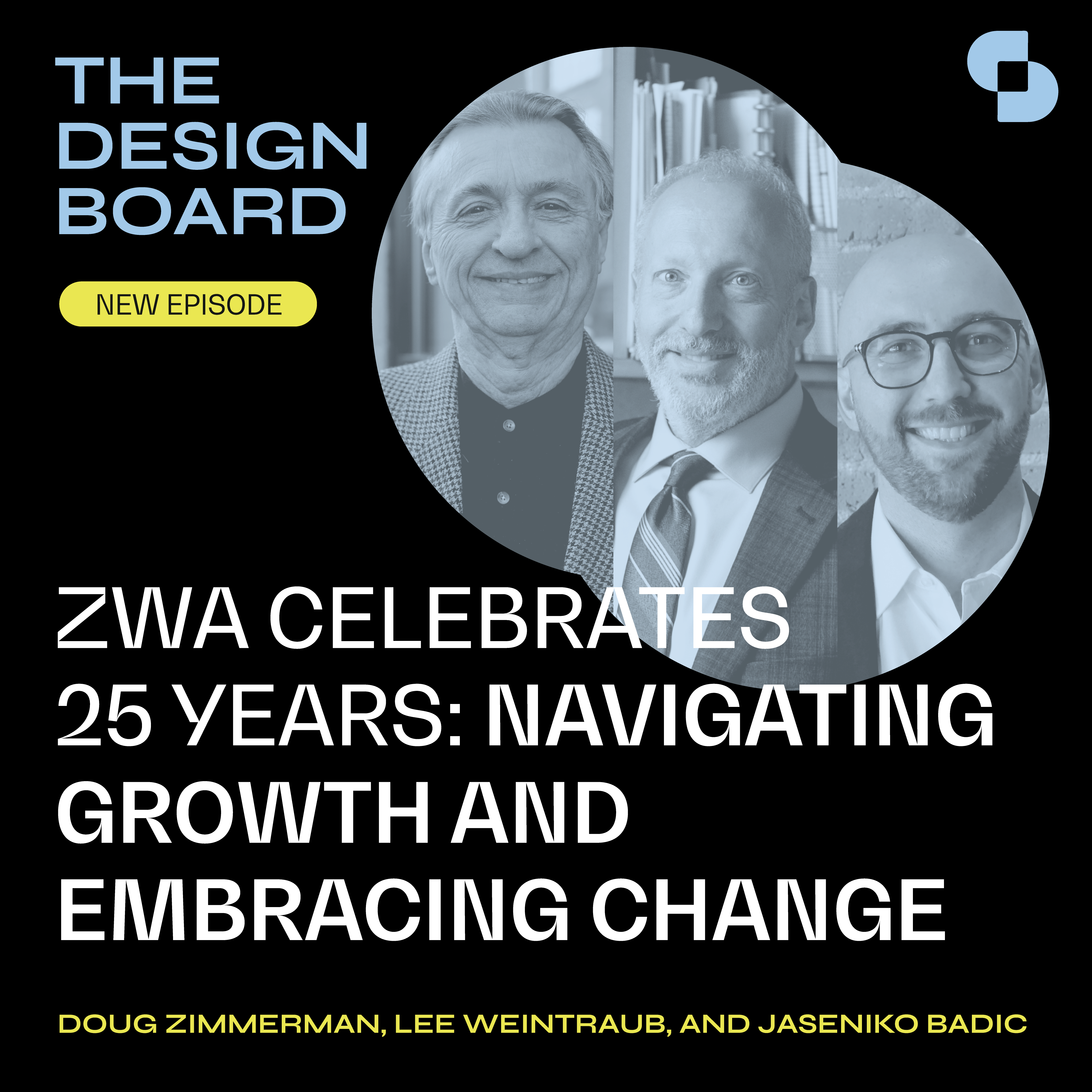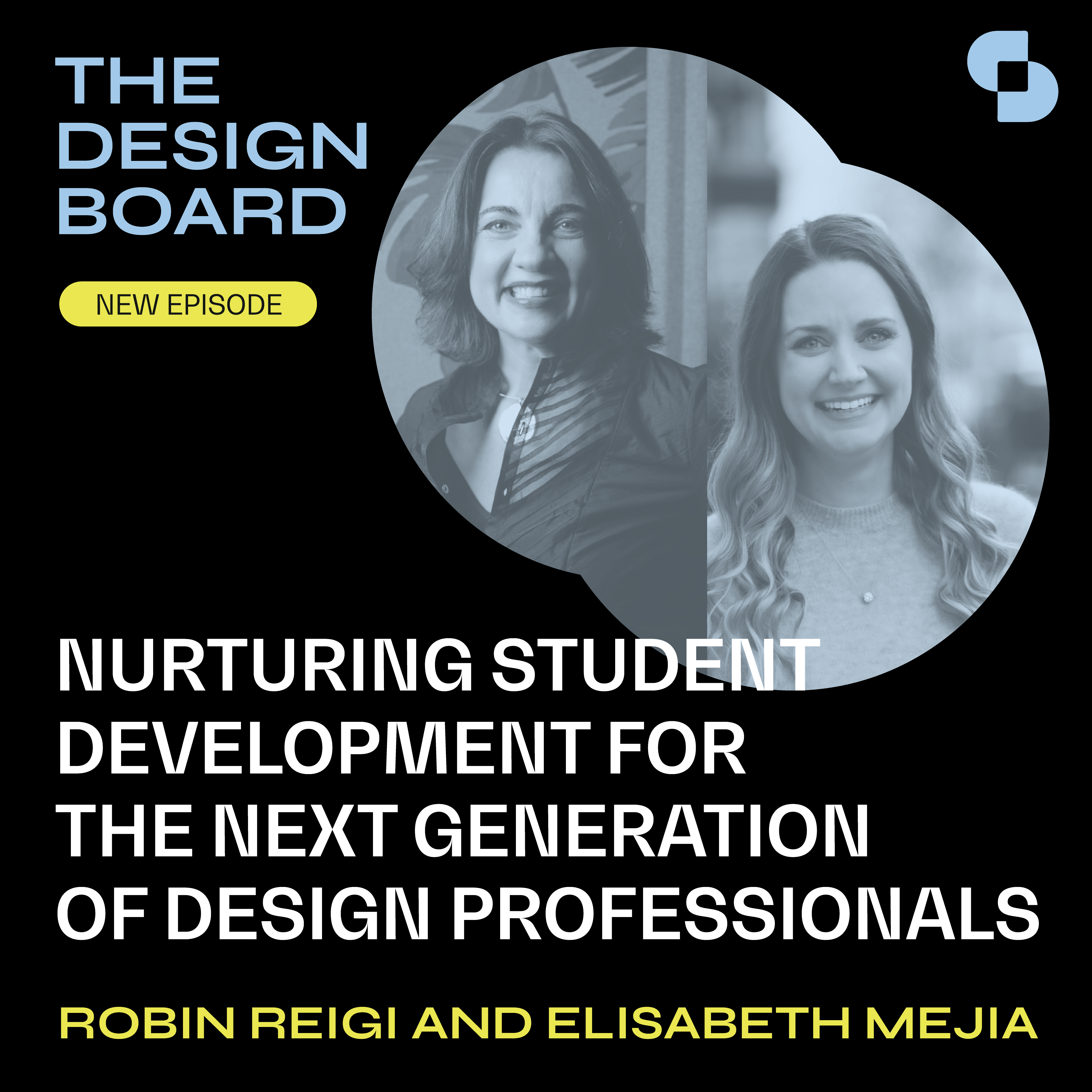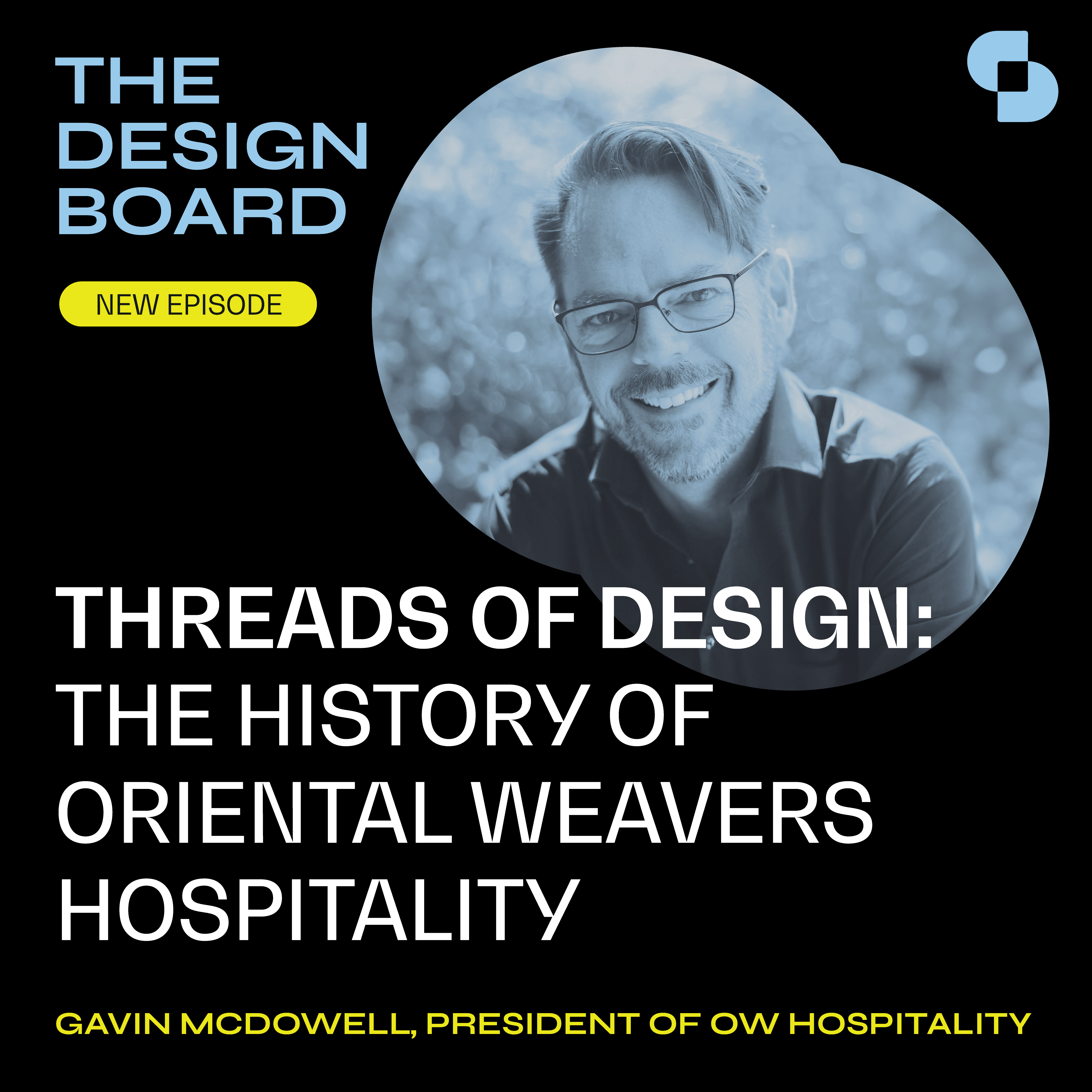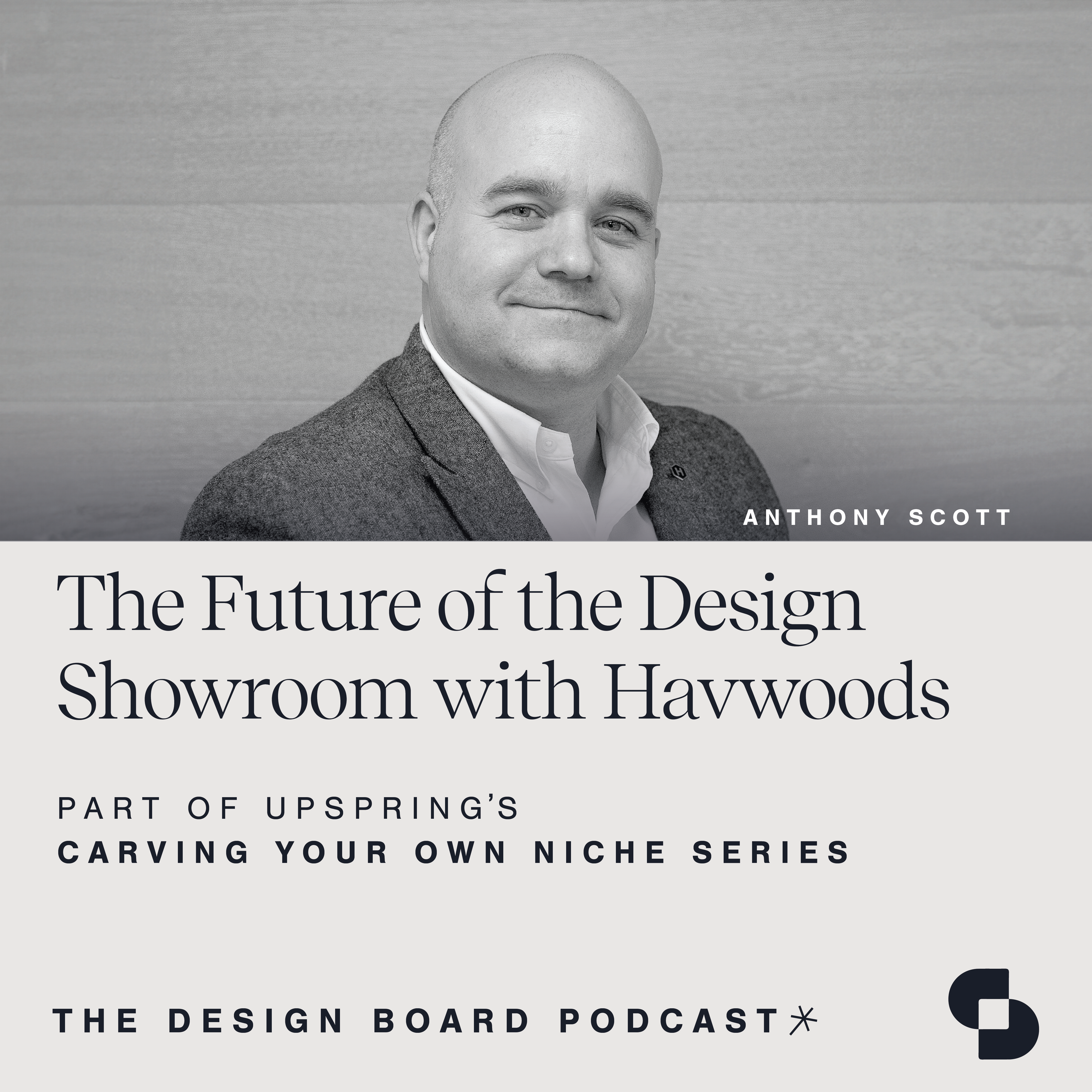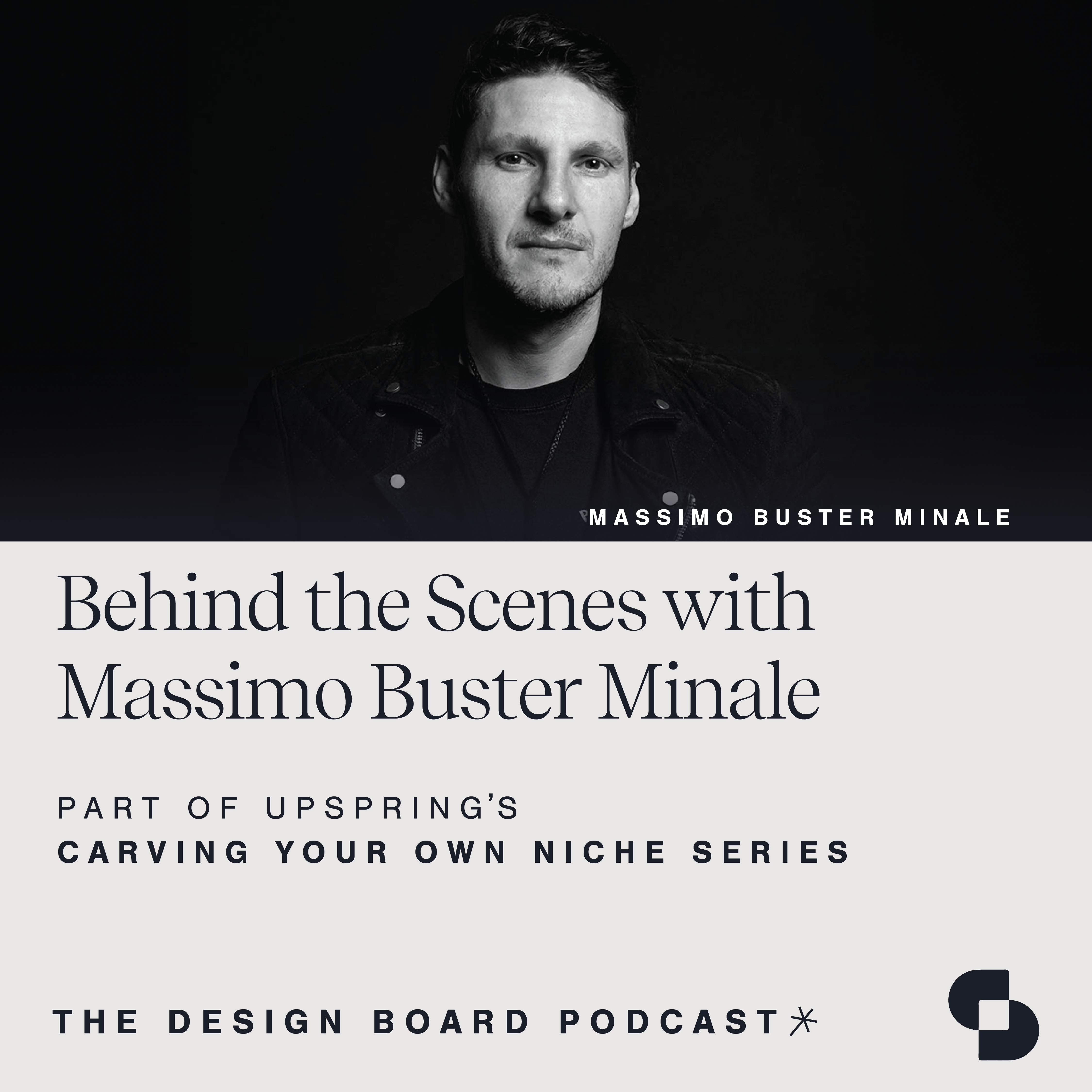In this episode, host Tiffany Rafii sits down with Anne Kulinski, Director of Marketing at Kirei, Michael DiTullo, an independent designer and creative director for Kirei, and Gordon Boggis, CEO of Carnegie Fabrics, to honor Kirei’s founder, John Stein, and his impact on the acoustics industry. Guests share stories and examples of how John’s leadership style helped shape the culture at Kirei and how his passion for sustainability manifested in the company’s day-to-day operations and business strategy.
The Design Board, by UpSpring, is a proud member of SANDOW Design Group’s SURROUND Podcast Network, home to the architecture and design industry’s premier shows.
Although the transcription is largely accurate, in some cases it is incomplete or inaccurate due to inaudible passages or transcription errors.
Tiffany Rafii: Welcome to the Design Board, a podcast created by the team at UpSpring that focuses on design, development and everything in between. We invite innovators in our industry and explore topics that support your growth in every way. The Design Board is a proud member of Surround, a podcast network from Sandow Design Group featuring the architecture and design industry’s premier shows. Check it out at surroundpodcast.com.
All right, perfect. Well, thank you all for being here today. We’re really excited to hop right in. Can you all give us a brief history of Kirei, when and how did it start?
Anne Kulinski:
I can hop in with that. Just wanted to say thank you, Tiffany, for having us on this and for having this podcast on John in general. John started Kirei in 2002. It’s a natural building materials company. He bought a few pallets of sorghum board, which is a fast growing, low water plant that can be manufactured into a building material. And he called it Kirei board, which was our flagship product, and started selling them basically out of his garage. As time went on, he added some natural materials, he added some coconut shell tiles, a variety of shades of bamboo. It was all focused on sustainable building, green building. And around 2014, don’t quote me on that date because it was a little bit before my time, John learned about recycled PET panels and acoustic material made from recycled plastic bottles. He added that to the line and we have just run with it since.
Michael DiTullo:
Yeah, I think that that story too is, just the starting of the company is such a John story. And for those of you that had the pleasure of meeting John, he was just such a bold guy. And I think he had a background as a creative. He was a copywriter. And I remember him when we started working together four or five years ago. I always ask everybody, company founders, what’s the story? How did this start? And he was just like, “Yeah, somebody showed me this board and I had this intuition, so I was like, ‘Oh, let me buy a few pallets and see if I could sell it.'” And that, such a simple yes, some people are yes people and some people are no people. John was a yes person. That simple yes turned into this massive company producing sustainable architectural elements. And I just try to remember that lesson from John all the time, to say yes more.
Tiffany Rafii:
He was definitely willing to try anything. I’ll give you that.
Michael DiTullo:
And our greatest strengths could be our greatest weaknesses sometimes. And it’s not because some people would say like, “Oh, maybe he had no fear.” It’s not because he had no fear. He was always thinking through what could go wrong, but he just didn’t let that stop him.
Tiffany Rafii:
So I’d love to hear how each of you got involved with the brand and just your history and sort of entry point with Kirei. Mike, do you want to kick that one off?
Michael DiTullo:
Anne and I started at pretty similar times. And again, John had built this, what I would call a distribution company based on importing different materials and distributing them to architects and designers, and had built a pretty comfortable existence with the successful company that was distributing different materials. And about five years ago, he decided that he wanted to shift from a distribution model to a manufacturing model to produce his own products. And so Anne and I came in within a few months of each other. She came in a few months before me. But I was speaking, I speak at a lot of conferences, I was speaking at this conference in Brooklyn called the Object Culture Conference that was, I think, part of New York By Design that year. And somebody had sent John the thing of me speaking there, because we lived literally a couple of miles from each other in San Diego, but I was speaking in Brooklyn.
And he was like, “Hey, I’m not going to this conference, but do you want to just have lunch?” And both of us being from New York, I feel like I grew up with a lot of guys like John. I kind of felt like I knew him even though I didn’t know him and I think the feeling was mutual and we just kind of clicked. And he was like, “Look, I really want to transform this company. Do you want to be a part of helping us not only designing products, but helping us figure out what products to make?” And it was kind of off from there. I met the team and remember Anne, we did that big two day workshop. And then it was just, he just wouldn’t let go. He was just like, “You’re my person.” And we just ended up talking almost every day for four years. And it was really kind of, I don’t know, just such a pleasure to be along for this ride with a company that a founder of a company that really wanted to remake everything he had done.
Tiffany Rafii:
Anne, would you like to share?
Anne Kulinski:
Yeah, so I actually found a job posting for Kirei, interviewed with John and our VP of operations, Leanne, at a coffee shop down the street. I remember in the interview, John and I just kind of nerding out about the elements of style by Strunk and White. And so Leanne was just looking at us like, “What is happening?” And so John and I always had this back and forth about writing, and that was something that drew me in was his passion of his opinion. And so it was from that point on, I was in. It was just like Michael said, there was a click and I wanted to help him with the business, help him with a company that was doing something good for the world.
Michael DiTullo:
And man, if you got Anne, John and I talking about Star Wars, everybody would have to leave the room for an hour. And remember the first collection we did together, Anne, was the Avio collection, which was a series of baffles, A-V-I and O. And it makes for a beautiful Italian sounding word, Avio. But the story behind it is they’re all inspired by the different spaceships and Star Wars, the X Wing, the Y Wing, that’s the A, the V, valuable little inside secret.
Tiffany Rafii:
Too funny. Gordon, do you want to share how you joined the team?
Gordon Boggis:
Yeah, sure. Look, I got to know John probably in late 2021. I had recently become CEO of Carnegie and was looking for like-minded individuals who shared a passion for wanting our industry and wanting companies in our industry to be a force for good. And what I mean by that is proving that great, high performance products that look fantastic can be delivered in a way that is environmentally positive. From a more business-y perspective, we were also looking to compliment Carnegie’s Xorel art form and wood skin acoustic products, and Kirei was a natural fit against all of that.
So I started to get to know John again about 18 months ago, and there was a great business fit of the two companies. But more than anything else, what I remember is the alignment of values and the passion of John. So we were both very, very committed to, again, proving that again, this industry can be a force for good, that all of the product functionality and aesthetic that we need can be produced in a more environmentally positive way, so there was kind of instant alignment on that.
But what made John extra special was he was just a real guy. So similar to what Anne and Michael have said, we talked about music, and John was happy to go super deep. I grew up in an era of UK punk and new wave, which doesn’t get a lot of traction in this day and age, and I’m showing my age, but John was in. He was into it. He could talk to it. He shared his own love for music. And it wasn’t just a love, it was a passion. So I think everything that John did, he was passionate about it, and that was just what made him so special.
Michael DiTullo:
I don’t think I met another person that has equally an eclectic music taste as I do as John, and maybe even more eclectic. Because if you hung out in his office, he always had music on. And it would be like Dr. Dre, Lachronic, followed up by Dio. I was just like, how do those two songs come after each other? But he just was just again, his kind of yes mentality.
And to build on what Gordon said with the acquisition, for me, I work with a lot of different companies and a lot of companies will have green initiatives, but it’s really rare to find one company, and in this case two, that were founded to be green companies. And so it’s not an initiative, it’s infused in every decision that John made. And I think he was a surfer. He was always at the beach, always in the water. He was seeing what was going on with his own eyes. And I think it was really important to him that Kirei found ways to make sustainable products that were desirable and also profitable. Where that Venn diagram overlapped is where we focus all of our energy.
Some people are more than a person, and I feel like, I’ll try not to get choked up, but I feel like John’s in the room with us a lot. We talk a lot about, it’s not like we say, “What would John would say?” It’s literally his words are a part of the conversation.
Tiffany Rafii:
I love that. Would you all be willing to share what your relationship with John was like and maybe some of your early memories with him would be I think really nice for everyone to hear. Anne, do you want to start with that one?
Anne Kulinski:
Sure. My relationship with John was, so he was a boss and a mentor. I was working with the founder of the company. He has a marketing background and I’m in marketing, so we kind of had a lot of passion for what we did and wanting to do it well and building out that program. And so it wasn’t easy at times, because he started off more as, I don’t want to say a micromanager, but he’s very process oriented and he wanted to make sure we were building out this incredible system to help the company grow. And so one of I think the best things was seeing him start at that place and then watching him grow throughout the years. Because he remembered that he was leading a team and the team was growing and he had to lead by example.
And so I think my favorite early memory is thinking about where he started and then to where he grew. And it was incredible to be a part of that journey with the company. Sometimes this is a hard topic, but I appreciated my time with him and I and learned an incredible amount from him because of his passion, his drive for bringing that sustainability message further than just himself.
Gordon Boggis:
And I can add to that. Look, again, I kind of knew John for less time than all of you, but all what I found, my initial relationship with him was as a business partner. There was a business transaction emerging of two companies, but that soon evolved to emerging of two minds, two passions, two commitments to the environment, et cetera, et cetera. But what I remember about John was he was humble enough to say frequently to me, “Nut joining and being part of Carnegie, I want to grow and I want to learn, so I’ve done this.” And it’s like, “John, you’ve done one of the hardest things in the world, which is to take an idea and a passion and literally found a company and make it successful and profitable and a leader in its field.” But he still wanted to learn more. And I think that’s to his huge strength that he could recognize that. And he kept all the passion. He kept the desire around proving great products could be environmentally sustainable. He was deeply committed to people and his team, but he was also self-aware and reflective enough to say, “Now in this next stage of Kirei, this next chapter for Kirei, I, John, want to grow.” And that was just a great part of him as a person.
Michael DiTullo:
Definitely had that lifelong learner’s mindset. I know he read more than anyone I know, just devoured information and was always trying to figure out how he could change what he was doing and how he could change what we were doing. He was a challenging person. And if John was on this call right now, he would say, “Thank you.” He was somewhat of a contrary, and he liked to kind of intellectually poke holes in things because I think he loved his mind puzzles. And we would have some knockdown drag out conversations that were really intense. And after the call, he’d call you five minutes later and be like, “Are you okay?” And just it was never personal. He just always really wanted to look at something from 360 degrees. Even if it was something he wanted to do, he would argue against it.
And I don’t know if I ever met someone who was quicker to say when they were wrong. I remember once, it was an initiative that I had argued against, but he was really passionate about. Moved forward and it didn’t work. And six months later he called me up just checking in. And I was like, “Hey, what’s up?” And he’s like, “This is the time where you get to tell me I told you so.” He’s like, “You were right. I was wrong. Say it.” And who else is like that? And so I really appreciated that about him, that he wanted a healthy debate on the team.
And it was, I think sometimes hard for him. What I tried to coach him on was to understand, well as the CEO, everything you say, it’s like it comes through a megaphone. But he always wanted to be on the team. And so helping the team to understand, okay, this is a time when John is just going to be one of us and we’re going to be discussing it. And there might be another meeting where he’s going to be the founder and decide. But right now, he’s just talking about it the way we’re talking about it. And I think that was something that I think a lot of people on the team had to get used to because not a lot of bosses are like that.
Tiffany Rafii:
I think a really big part of it is that he, from a really authentic place, wanted to take everyone along with him. This was never about what he wanted or he believed and pushing that. The reason I think he would argue against himself, to your point Michael, is that he really wanted the best possible outcome and he wanted everyone’s buy in, take them along with them. And even in my experience interfacing with him, we have a hundred clients and at any given time through the ecosystem of UpSpring hundreds more that I have interacted with their founders, and there are very few who wanted to take me along right with them. So I think that, to your point, is incredibly unique about the way that he ran the business and really operated with his team.
Michael DiTullo:
Tiffany, you’ve known him the longest of us. How did you connect with John? There’s got to be a story there. Come tell us.
Tiffany Rafii:
Actually, funny enough, the digital marketing agency that joined UpSpring a year ago now was Kirei’s digital marketing agency eight years ago. And Susan, who’s now our VP of Digital here at UpSpring and who ran Epiphany, called me out of nowhere, I didn’t know her, and said, “We have this company. They do acoustical panels and this, that and the other. And they want to add a PR component to our service offering. Would you all be able to help us out and partner with us?” And I said, “We’re happy to have a conversation and explore that.” And she warned me and she was like, “He’s going to be tough, but he’ll be fair.” And I was like, “I can handle anyone. Send him my way.” So Susan made the introduction to John and we started working together and Kirei’s been part of the UpSpring family ever since.
But my relationship with John really lived outside of the ecosystem of the actual PR and marketing work. For us, it was more of a business operations friendship almost where he would call me out of the blue. He’s one of the few clients who would just ring my cell phone and be like, “This happened three times. Are you seeing it too?” And would just want to kick the can around and see what we’re seeing amongst our clients and the trends that we’re noticing. Really again, to all of your points, just wanting to learn and stay smart and ahead of the curve. He would, through the years, share every resource that ever helped him with me. Any consultant that he felt helped the business level up, he’d be like, “You guys should talk to this person.”
So for me, it’s super emotional from the perspective of having someone in our corner from an advisory perspective really lives outside of the normal client relationship that we might have where he really wanted, he knew that our growth would only support his growth. He wanted us to be the best version of ourselves at all times, which was really, really amazing. And I always have been super grateful for.
So I’d love to have you, I mean, you talked about this a tiny bit so far, but if you have anything you all want to add about John’s leadership style and how his style helped shape the culture at Kirei.
Michael DiTullo:
I think if I could kick off, one of the things kind building on what Gordon and you were saying, Tiffany, about his constant learning and we talked about his journey a little bit. John was someone that, he never worked for a big company. And so I think he was really figuring out who he wanted to be as a leader. And it’s funny because he came off a lot as being, as Anne said, super process oriented, very detail oriented, very this then this then this. And it could be really frustrating at times, to be honest, because for someone who had this very creative mind, he put himself in this very linear thinking.
And at one point I would just call him up. I rang his phone, Tiffany, and after a meeting, I was like, “Why are you like this?” And he was like, “Michael, it’s because I’m fighting all my instincts. My natural self is I just want to be on the beach surfing.” And he’s like, “I’m so afraid. And because I never worked for a big company,” he’s like, “I’m so afraid if I don’t put the structure on myself that I would just slack off.” And I was just like, “Dude, you are so far from slacking off. You could dial it back 30% and still be way out ahead of slacking off.”
So I think he was trying to find that in himself, and especially as the company scaled. Because like Anne was saying, before Anne and I joined, the team rapidly grew in the last four or five years. But before that, it was really small. And so I think it could be really hard for a founder to wrestle with that like, “Okay, I have to go from the doer to the inspirer.” And I think he was just kind of finding that way.
And about 12 months us or so before he passed when he had to step away from the business, I know he was just really scared that it would still run, as any founder would be. And I remember six months in having this really tearful conversation with him and him just saying just how proud he was of everybody that not only did it keep going, it kept growing. So I really feel like right within the last couple years of his life, he found this new leadership style that was finally opening up and really going from I have to decide everything to I can empower other people to decide things.
Gordon Boggis:
And again, Michael, I dab to that. When John had to step back from being in the business on a regular basis, he and I had conversations and exchanged emails. And he was very gracious in terms of, he was saying, “Look, it’s great that Kirei is part of the Carnegie family because it feels so right. The fit’s so good.” But then he immediately went to, “And the people are in good hands.” And he cared passionately about people and his team. And it was just so good to hear him say, “The Kirei people, they’re in good hands.” And he was delighted and gosh, at that point, just so gracious and so focused on other people when he was clearly having to deal with so much from his side. So that was just a wonderful piece of feedback to get from him.
Michael DiTullo:
Yeah, I think to know John, he wore everything on his sleeve. Every thought, every feeling, you knew it. Where you stood in that second. And I remember the moment he called me up and was like, “Hey, in talks with Carnegie. What do you think?” And I could tell the way he said it to me was like he was afraid I was not going to be. I was surprised. It was timid and I was like, “John, this is like, it’s the right company. It’s the right time. If this was two years ago, you wouldn’t have been ready. This is the exact right moment for this to happen.” And I could just feel the sunshine in his voice and he’s just like, “Okay, cool. That’s what I was thinking too.” And I really appreciated the trust that he showed just like he would tell people things, and that kind of transparency makes people feel bonded to the mission.
Anne Kulinski:
As an employee of Kirei, I have to say that what John did for Kirei was incredible, finding Carnegie and like you said, how the values and the mission align so well. He found a safe home for us, and I think that’s the best. We’re all able to continue to learn and grow and build the company. And I just think he would be incredibly proud of that.
Tiffany Rafii:
Couldn’t agree more. John is recognized as a significant figure in the acoustics industry for promoting sustainability and his personal flare. Can you share some stories or examples of how his passions were integrated into Kirei’s mission and products?
Michael DiTullo:
I think one of the things that comes through, Anna and I were talking about the Kirei voice yesterday, and we spent a lot of time working on the voice of the company, the three of us, John, Anne and I. I think it originated with him in that a lot of companies in this space are more authoritative. The way they speak is in a command voice of, “We’re the best and you should respect us.” And I think the insight that he had was like, “That doesn’t really work. We are talking to really busy architects and interior designers who also know a lot, and we don’t want to command them. We want to be their friend.” And I think that casualness, we tend to be a little bit more punny in our product names and in our communications, and that’s like all John. And I think that just fun comes through. And then we helped him shift that voice from his personal voice to a voice that just feels more of a true friend to the designer. And he was, again, able to let that go and step back a little bit. But I think that that core insight of just being a little looser in this category and talking to our client more as a peer, to our customers more as peers, I think is a big influence of him and the way we do things.
Gordon Boggis:
And I think John also shines through in just how bold the designs are. Look, Michael’s a hugely talented lead in terms of developing the Kirei product range, and lots of people contribute within curate to product development and product design, so many people. It’s a wonderful team effort. But I think John also believed that, “Look, we’re going to take this great post-consumer recycled content, but we want to produce something that’s striking, that does its job, that manages acoustical challenges for spaces. But boy, oh boy, do I want it to be striking.”
And I think that’s evident that this very day. You just look at the latest Tessellate collection just been released, Tessellate baffles. They are striking. There’s no other way to describe them. They’re so distinctive. They own a room. And I think that, again, is part of John’s passion. He was highly creative. He pushed people. He pushed everybody. And so it’s kind of not generic looking squares. It does a great job. It’s going to be post-consumer recycled content. But boy, oh boy, is it going to be a striking statement for any installation. And I think that’s to John’s great credit as well. He wasn’t afraid of that. In fact, quite the reverse. He wanted to push the team to deliver that.
Michael DiTullo:
Gordon, Anne, I don’t know if I ever told the two of you this story, but it won’t surprise you. But the day of the air baffle launch … so we worked for a year, a year and a half on this baffle where we partnered with Nike, we partnered with a 30 billion company to do this infill made from recycled post-consumer footwear as acoustic performance. And just getting this thing over the finish line, it was a really big effort for the size company we were. And the day it launched, I called up John and I was like, “Congratulations, you did it.” And I was so pumped. And he was like, “Yeah, that’s pretty cool. What’s next?” And that was the rear view mirror already. That was cool. That was 9:00 AM. It’s 10:00 AM. What are we going to do next to beat it?
And it’s rare that you work with somebody … you know could either take it one or two ways. You could be demoralized by that, or you could take it as the open challenge that it is to one up yourself next time. And I love that. I think that was just the, “All right, let’s do more.” And it’s really rare to collaborate with someone who’s like that.
And you had to be careful because I know if I showed John three things like, “Okay, there’s three options for this, which one should we do?” The answer would be, “Yes.” “What do you mean, yes?” It’s like, “Do all three.” It’s like, “No, we got to do one.” But you could have those conversations with him, but that was his push.
And Gordon, you said it comes through in the Tessellate launch, and I just wanted to share one story on that launch in particular. We were doing the Tessellate baffle, which is a horizontal baffle. And we have this pretty organized system to launch products. And after the fourth gate meeting, which it’s like the product’s pretty finalized, John called me and was like, “What do you think if we took that tessellate baffled and just made it vertical? Is that anything?” And I was like, “Yeah, that’s actually brilliant because it’ll mix with HVAC better and mix with lighting better.” And that product was one sentence from him or one question, “Is that anything?” And that became a product in the launch. And I always get a choked up when I talk about that product because it was literally just his idea.
Tiffany Rafii:
So we all know, as we’ve chatted through a bit so far, how passionate John was about sustainability. How did that manifest in the company’s day-to-day operations, product development, business strategy? A lot of companies say they focused on sustainability, but for John, it really ran through the moral fiber and really just the entire company top to bottom. Can you all just chat to that a bit?
Michael DiTullo:
Anne, you were with him day to day, and I don’t want to pick on you, but do you have anything?
Anne Kulinski:
I mean for day to day, this was a tough question. It was basically I feel like his passion for sustainability was the thing that drove the business. So bringing that in every day and the fact that he made it fun, that was something that I looked forward to coming to work every day. I didn’t mind working longer hours because it was just fun to be there and know that we were doing something, like we had a mission together and it was for a better planet. In terms of product development, I know Michael can speak a little bit more about this, but our products are built, they’re made from recycled materials, but then they’re also built in a way that we want them to live for a longer period of time in a building so that it’s not something we’re just kind of cycling through. It’s not, “Okay, this now goes into the dumpster or the recycling bin.” It’s something that it has a longer lifespan. And I know there’s other details about our product development Michael can go into, but I think that having that mindset is something that really just helped drive us every day.
Michael DiTullo:
I think in product he’d always just go down a level deeper than anyone I’ve ever worked with where it’s like, “Okay, yeah, sure, our PT is 60% recycled product, but what about the hardware that holds it up?” “Okay, well it’s okay, John, it’s aluminum. That’s a highly recyclable material. That’s great.” And he’s like, “Okay, but what about the clear anodization finish on the aluminum?” I’m like, “I never thought about that. I don’t know how green that is. That’s a good question.” And he was always just like, when you have a little decal on something and a little corner is flipped up, and he was just like, “Let me just peel this back a little bit more and see what’s underneath.” And I think it’s because like I said, it’s not like there’s a green initiative at this company, it’s literally the purpose for the company to exist, which is really similar to the founding story of Carnegie too, which I think is why there’s such a synergy.
Gordon Boggis:
And I think that’s another aspect of this, that John wanted to work with people, whether they were employees within Kirei, advisors, partners, whoever, he wanted to work with people and organizations that were authentically committed to proving their environmental credentials and being a force for good.
So again, one of the very first questions he asked me as we were finalizing the deals for Kirei to become part of Carnegie was, “And when are we going to be a B Corp?” So Carnegie has for 12 years been a certified B Corp in a world of green washing. That’s a very high bar of external authenticity, commitment to environmental, social, the way we govern the company having a triple bottom line. And John just immediately jumped in, it’s like, “Here’s little Kirei, and can they be a B Corp tomorrow?” “Well, John, it’s an extensive process, but yes, Kirei will now be included in that process when Carnegie goes through its recertification.” So yeah, it wasn’t just product, it was the people, the organizations. It was just an overall ethos. And again, I think that’s what made the merging of the two families so easy, that there was just such a strong alignment of values that we wanted to authentically be a force for good.
Michael DiTullo:
And I think he was always looking for the ways new technologies could help the company be greener. And I remember when we first started working together, Anne, and how hot John was on QR codes. And he is like, “We could just put QR codes on things and then we don’t have to print stuff.” And Anne and I were like, “Nobody uses QR codes.” And then when the pandemic hit, QR codes just became a part of all of our lives. And he was like, “I told you those QR codes were going to be something.”
And we shifted to just … and now that we brought printing in house so we can print on samples, we don’t have to use stickers and we can print QR code on the back so somebody can scan that with their phone and get a digital spec sheet. And so just all these little things are like, “How can we just be greener, even if it’s just one half of 1% greener?” And just looking for that kind of continuous improvement as it’s called.
Tiffany Rafii:
I love that. That’s such a good idea. We should have you all run a round table on tips and tricks for taking it to the next level. That’d be so fun.
Michael DiTullo:
And every little bit helps.
Tiffany Rafii:
A hundred percent, no question. I would’ve never even thought of that. That’s incredible. Looking back, what do you think John would be most proud of about Kirei?
Anne Kulinski:
I’ll say hands down, the team. I think he’d be incredibly proud of how so many of our team members have grown. When I started, we were six or seven people. And now we’re at 24, 25 plus Carnegie. And I just think he would be so proud of our growth and how post acquisition with Carnegie, the team is thriving. And I think he believed in all of us, and that was part of why we worked as hard as we have always worked because he believed in us. And I think he’s cheering us all on to keep learning and growing and building Kirei and the Carnegie team together.
Tiffany Rafii:
And that motivation extends to the PR team here. I know they continue to live to make him proud, so I can totally hear that. Michael, do you have anything you’d like to add?
Michael DiTullo:
Yeah, I’m just going to build on that. I remember the first few product cycles we went through together where they were difficult. There were contentious moments. There were tears at times for people. But then the bumps started to smooth out as we built the system together. And I remember two years ago or so, he called me and he was just like, “Yeah, it’s great because the product development is just automatic now. We don’t have to even think about it.” I was like, “Well, I spend a lot of time thinking about it.” And he’s like, “You know what I mean? Maybe I said it wrong.” But he’s like, “What I mean is that I don’t have to think about it too much because it’s all just happening.’.
And I think he was so proud of how the team developed as an organization and almost like an organism. It’s just like it’s doing what it was designed to do. And I think it’s really, like I said, transitioned from him having to be out front leading the charge to, oh my gosh, it’s just the charge is just happening and I can see it happening. And wherever he is, I hope he still sees it happening and it’s just like, wow, the company is living up to the potential that he hoped it would.
Gordon Boggis:
Yeah, I’d echo all of that. I think he’d be very proud of the team, of the people. And also the legacy is that Kirei continues to be a leader in its field, continuing to prove that great acoustic solutions that people want are also delivered in an environmentally sustainable way. And John would be proud to continue to provoke, galvanize, educate, work with, inspire the rest of the industry to come along. Look, we operate within an industry that unfortunately is awash with green washing. It’s a very relevant topic. And I think John would be very proud that the Kirei is kind of a figurehead, an example of how it can be done. I think he’d be hugely proud of that.
Michael DiTullo:
I think one of the last conversations I had with him, we were talking about some of this. And I think John was an incredibly humble person, a very self-effacing person. He had this external confidence and humor that I think made people feel differently about him. But once you got to know him, you realized how much he pushed himself. And if he was critical of you, it’s because he was 10 times more critical of himself. And we were talking about some of these things, one of the last conversations I had with him. And I had to be like, “John, you did this. Can you just stop for one second? Give yourself the compliment of realizing you willed this company into existence from two pallets in your garage. And just for one second, pat yourself on the back because it wouldn’t exist without you.”
Tiffany Rafii:
So my last question for you all, what do you think the future of the industry will look like, especially in light of John’s legacy? Where are we headed?
Anne Kulinski:
I’ll say the future is bright. In the last 20 years, I know when Kirei first started, the mindset, the sustainability was a necessity. It just wasn’t there. So it was kind of shouting about that, making sure people understood it. And now in the last five years, leading design firms, that is their priority. And so I think we know where the planet’s at, we know where it’s heading, and we know what we have to do. So really it’s up to us as manufacturers, designers, as human beings to continue to push that mission forward. And I think John was so impactful early on 20 plus years ago, and just the future is bright.
Michael DiTullo:
I think it definitely has gone from a push to a pull. When 20 years ago it was really having to push sustainability and push acoustics, to now it’s just table stakes that designers are like, “Well, of course this is sustainable.” And I think the future, Tiffany, I think will be in a yes/and state. So just being sustainable will not be enough. It’ll be, “And what else does it do? What else can this do for me?” And I think that’s where we’re trying to push with the Tesselate collection, where it’s like, “Yes, this is going to improve the acoustics of the room. Yes, it’s sustainable. It’s also a visual statement piece, and it’s like fricking gorgeous.” And it’s like you can’t just be a sustainable material anymore. You’re going to have to bring a little bit more to the space than that.
Gordon Boggis:
Yea.,. Look, I’m optimistic as well, but I think there’s some hard work ahead of us within the industry. It’s a critical time as we’re literally 24 hours from reports being issued that the planet continues to warm up at alarming rates. But I am optimistic that as an industry, we’re prioritizing that. And I think what we want to do with Kirei, with Carnegie, and with everyone who wants to come along with us, is to continue to collaborate, to educate, to inspire. And I think the challenge is that there isn’t perfect information at the moment. People make better decisions when they’re better educated, have better access to information, and that’s what we are also all about.
I encourage everybody to just as they are specifying, just think for an extra minute and dig down into the true, holistic impact of decisions that are being made. We live in a very visually driven industry, and so we should, things have to look great. But human health, environmental health, social health and equity, a holistic approach to environmental impact are hugely important factors. And we want to be a big part of educating, providing information, because we have an authentic commitment to getting to the right place and we’d like to inspire others to come with us. So please, think for an extra minute> it’s going to take a little bit more hard work to get the authentic information, to dig down a little bit more, to make sure that you’ve not been green washed. And that’s, I think, a kind of objective and passion that John would be hugely proud of and hugely supportive of.
Tiffany Rafii:
Well, thank you three so much for taking time out of your day to have this conversation with me. I think for all of us, we continue to find ways to honor John, and this was one small way that we could do that. So I also think from many perspectives, his story is not only inspiring, but motivating to everyone in the industry, no matter what your position or role in it might be. So thank you again for all of your sharing. I know not easy, and I look forward to continuing the conversation with you.
Michael DiTullo:
Thank you so much, Tiffany, for giving us the platform to remember John and tell his story.
Gordon Boggis:
Thanks, Tiffany.
Anne Kulinski:
Thank you, Tiffany.
Tiffany Rafii:
Of course, of course. Thank you, guys.
Thank you so much for listening in with us today. We hope you leave inspired by the ideas in today’s episode. For more, follow UpSpring on LinkedIn and Instagram. And don’t forget to check out the amazing lineup of shows brought to you by the Surround podcast network at surroundpodcast.com.

